Fitness to Drive—the Tests Under the New Act
Page 43

If you've noticed an error in this article please click here to report it so we can fix it.
WITH the approach of Christmas, the Minister of Transport considered that the moment was opportune for bringing into force the new provisions in the Road Traffic Act, 1962, with regard to unfitness to drive. As substantial alterations in the previous law have been introduced, it may be of advantage to summarize the present position.
The previous test of "under the influence" of drink or drugs has gone by the board. The new one is impairment of the ability to drive properly. The door, in fact, has been flung wide open and defendants who could not have been brought within the four corners of the previous test may now find themselves liable to prosecution.
The reason which has produced the impairment is quite immaterial, though doubtless it will be taken into account in passing sentence, if there is a conviction. The reason may have nothing whatsoever to do with drink or drugs. Temporary indisposition or physical or mental disability, or constitutional ill health of some kind or another might produce a state of impairment, whether sudden or otherwise. The driver would notwithstanding be regarded as unfit and committing an offence in driving while in that state.
Again, a person may he quite capable of driving but on the other hand he may not be able to drive properly. If his state
of unfitness, although allowing him to drive, disables him from driving properly, an offence will be committed. So much for the alterations in the law as such. At the same time, however, procedural changes have been introduced.
• Certain statutory tests are now provided.
If the police propose to charge a driver, they will request him to submit to a blood test, for the purpose of ascertaining the extent of alcohol or drugs in the blood or in the body.
Moreover, they may also request the driver to permit a sample to be taken of his urine and of his breath, though the tests as to breath have not yet been brought into operation.
The Act, however, does not impose any obligation on the driver to submit to any such test; but refusal to do so, unless it can be shown to be reasonable, is bound to be taken into account to the prejudice of the driver at the hearing.
If tests are to be taken, the driver, it seems, will be entitled to require that they should be taken by his own doctor, and to be submitted for analysis to his own analyst The police, however, may insist on their own doctor and analyst, leaving it to the driver to "take a second opinion ", as it were, from the experts of his own choice.
Where samples are taken, the driver should exercise his right of being supplied with a specimen. Where the police have an analysis made, they will obtain a certificate from their analyst.
A copy of this certificate must be served by them on the defendant driver not less than seven days before the hearing. If the defendant desires to challenge it he must give the police notice, at least three days before the hearing, requiring their analyst to attend court in order to be cross-examined.








































































































